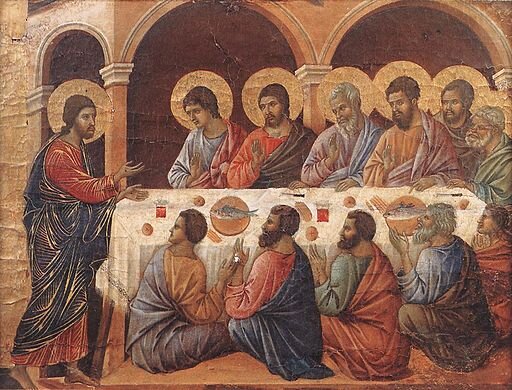by Fr. Bill Garrison
Please note that the following sermon text was provided prior to the audio recording. The two versions may differ substantially.
John 20:1-18
Early on the first day of the week, while it was still dark, Mary Magdalene came to the tomb and saw that the stone had been removed from the tomb. So she ran and went to Simon Peter and the other disciple, the one whom Jesus loved, and said to them, "They have taken the Lord out of the tomb, and we do not know where they have laid him." Then Peter and the other disciple set out and went toward the tomb. The two were running together, but the other disciple outran Peter and reached the tomb first. He bent down to look in and saw the linen wrappings lying there, but he did not go in. Then Simon Peter came, following him, and went into the tomb. He saw the linen wrappings lying there, and the cloth that had been on Jesus' head, not lying with the linen wrappings but rolled up in a place by itself. Then the other disciple, who reached the tomb first, also went in, and he saw and believed; for as yet they did not understand the scripture, that he must rise from the dead. Then the disciples returned to their homes.
But Mary stood weeping outside the tomb. As she wept, she bent over to look into the tomb; and she saw two angels in white, sitting where the body of Jesus had been lying, one at the head and the other at the feet. They said to her, "Woman, why are you weeping?" She said to them, "They have taken away my Lord, and I do not know where they have laid him." When she had said this, she turned around and saw Jesus standing there, but she did not know that it was Jesus. Jesus said to her, "Woman, why are you weeping? Whom are you looking for?" Supposing him to be the gardener, she said to him, "Sir, if you have carried him away, tell me where you have laid him, and I will take him away." Jesus said to her, "Mary!" She turned and said to him in Hebrew, "Rabbouni!" (which means Teacher). Jesus said to her, "Do not hold on to me, because I have not yet ascended to the Father. But go to my brothers and say to them, `I am ascending to my Father and your Father, to my God and your God.'" Mary Magdalene went and announced to the disciples, "I have seen the Lord"; and she told them that he had said these things to her.
There was a boy who worked in the produce section of a super market. A man came in and asked to buy half a head of lettuce. The boy told him that they only sold whole heads of lettuce, but the man replied that he did not need a whole head, only half.
The boy explained that he would have to ask the manager and so he walked into the back room and said, “There is some jerk out there who wants to buy only a half a head of lettuce.” As he finished saying this, he turned around to find the man standing right behind him, so he quickly added, “And this gentleman wants to buy the other half.”
The manager Okayed the request and the man went on his way. Later on, the manager said to the boy, “You almost got yourself in a lot of trouble earlier, but I must say I was impressed with the way you got out of it. You think on your feet and we like that around here. Where are you from, son?”
The boy replied, “Minnesota, sir.” “Oh, really, why did you leave Minnesota?” inquired the manager. The boy replied, “They're all just loose women and hockey players up there.”
“My wife is from Minnesota”, exclaimed the manager. The boy instantly replied, “Really! What team did she play for?”
That young man will go far.
I think celebrating Easter every year is so very important because it gives us a chance to get back to the basics of our faith. We ask ourselves important questions which help us gauge how we are doing in our walk with Jesus. How much of our lives are we spending in partnership with Him? Is God truly receiving the majority of our attention or are we only peripherally aware of the grace we receive every day? Are we, like the man trying to purchase a half a head of lettuce, half in or are we all in? Has God truly got our attention?
It seems to me that we struggle between Easter and Good Friday. We struggle with which is the reality of life. And as we arrive here this morning, we have to admit that Good Friday is everywhere we look, every news story we hear.
The pandemic isn’t over yet in this country. We live with the awareness that more people are going to die before it leaves us.
The horrors in Ukraine are constantly before us and we can’t help but wonder how many more must die before the killing stops.
The media is having a field day with the reality of inflation as they predict doom for the economy.
Gun violence has reached epidemic proportions and there is so much of it that only the most heinous examples make the front page of the paper.
And it has become almost impossible to discern whom we can trust with power.
I could go on but it isn’t necessary. This is what Good Friday looks like in the world within which we live and frankly it gets a lot more play than Easter does.
Mary Magdalene went to the tomb on Easter morning before dawn with no expectations other than to tend to the body of Jesus with spices. She was still suffering from the loss of her teacher. She was still in a Good Friday frame of mind. What she found was an open tomb. She was instantly afraid Jesus’ body had been stolen. Here Good Friday feelings instantly grew even darker in that fear.
As the story continued Peter and another disciple raced to the tomb and found the wrappings lying in the tomb but no Jesus. Hmmm, what could that mean? They returned home wondering about it.
Mary remained at the tomb and encountered a man she mistakenly assumed was the gardener. But when she heard his voice, she instantly knew it was Jesus, risen from the dead. Resurrection. In that moment her Good Friday feelings evaporated and her Easter joy began. Resurrection had changed everything. She and her followers were soon shouting the good news for everyone to hear.
Now please understand. Nothing had changed in the world around them. The Romans were still in charge. Life was still incredibly hard. But how one encounters the world, the Good Friday world if you will, had changed. Where joy had made no sense before the resurrection, now joy was the only feeling that did.
Resurrection has no meaning unless others talk about it. Resurrection has no purpose unless others talk about it. Resurrection only has meaning if we share the good news of Easter with a world living Good Friday. Resurrection only can have meaning for those living as Easter people. Our job, as Easter people, is to tell others about resurrection and to keep reminding ourselves about it too.
So go and tell the world human beings no longer need fear death.
Go and tell the story about the life of Jesus Christ.
Go and tell the story about Jesus’ blueprint for living.
Go and tell the story about the Kingdom of God, right here, and right now.
Go and tell others about the joy found in doing the loving thing.
Go and tell the world that Good Friday is never the end. Resurrection is on the way.
This Easter my we open our whole selves to the meaning of resurrection. May we feel the love of God every day in our lives. May we commit ourselves to God’s work, following Jesus into our futures, knowing the joy, hope, and power found in his resurrection.
Hallelujah, Christ is Risen!








![Stained glass: Alfred Handel, d. 1946[2], photo:Toby Hudson / CC BY-SA (https://creativecommons.org/licenses/by-sa/3.0)](https://images.squarespace-cdn.com/content/v1/571beb3be3214001fb407fd6/1588632415986-V8E734MVGGPZIADN0HE1/1024px-StJohnsAshfield_StainedGlass_GoodShepherd_Portrait.jpg)

